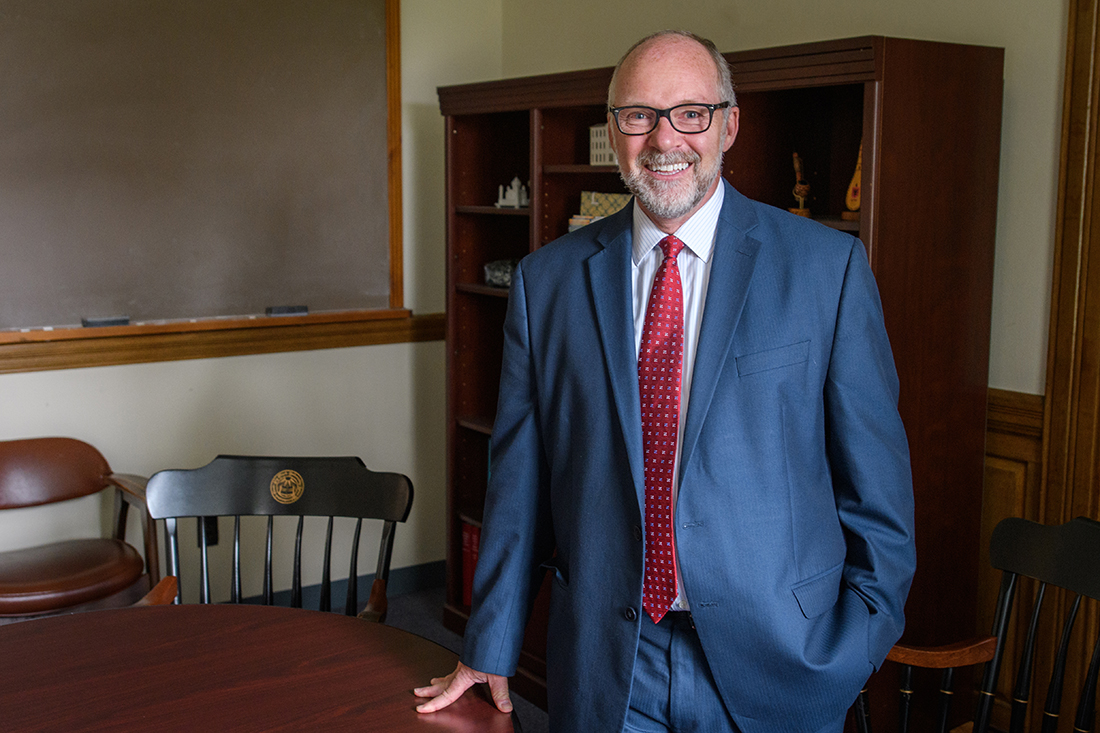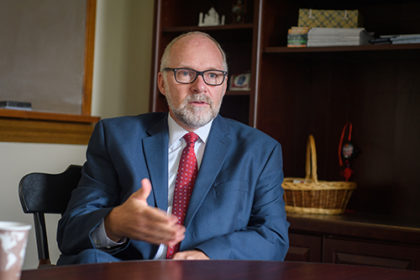New dean envisions a robust future for Clark’s School of Professional Studies

John LaBrie knows what it’s like to work for an education.
The youngest of nine children, he grew up in the small town of Fort Kent, Maine, on the Canadian border, and was the first in his family to attend college rather than take the expected path into the lumber or farming industries.
After a brief stint at the University of Maine at Orono, LaBrie enrolled at the University of Maine at Fort Kent (UMFK), his hometown branch of the university system. Money was tight, so he took a job at the university, eventually moving into the role of food services director. His employee status allowed him to take courses at no cost, and while he fed the campus he filled his mind, emerging with a bachelor’s degree. The process took 10 years.
Advanced degrees followed, as well as a long career in higher education, most recently as dean of the College of Professional Studies at Northeastern University and as founding principal and dean of Northeastern’s Toronto campus.
LaBrie has joined Clark University as dean of the School of Professional Studies and associate provost for professional education, where he will be shaping an educational approach that draws not only on his academic acumen, but on his experience as a nontraditional student aspiring to greater things.
“It took me a long time to come to the realization that higher education can be transformative for people’s lives in regard to social mobility, personal development, and career advancement,” he says. “That informs the way I think of education today. We have to meet the students where they live.”
The School of Professional Studies offers graduate degrees and certificates in a variety of areas, like public administration, information technology, health informatics, and educational leadership. There is no “typical” SPS student. They could be a working professional aspiring to a leadership position within their company, or enrolling in a degree program in the hopes of launching a new career. The student may be a former Clark undergrad who is pursuing an advanced degree through the University’s Accelerated B.A./Master’s Program, or may be an international student seeking to bolster their career prospects while becoming immersed in a new culture.
LaBrie says SPS will be looking to provide more avenues for learning to students from a range of circumstances. The timing could not be more crucial. He notes that the master’s degree has virtually supplanted the bachelor’s degree as the gateway to the middle class. People also are switching careers more often than in the past, and their working lives are lengthening as lifespans increase.
“We’ve reached a foundational moment when institutions have to take inventory of who they are at their core, return to that, then reassert it in a different way,” LaBrie says. “This is about individuals looking for a better life, and it’s our job to help them realize that through the power of education.

“It begs the question of how universities are organized to grow and adapt to these new market realities. One thing that excited me about this position is that Clark has the self-awareness it needs to assert its academic and educational mission for a new era.”
Making graduate professional education accessible will be key to SPS’s growth. LaBrie is paying close attention to where SPS students are finding employment, what the rising professions are, and how Clark can articulate its intellectual offerings for an ever-changing employment landscape.
He’s also serious about making the process of learning more user-friendly for people dealing with career and family obligations. Among his priorities will be the implementation of a strategy to supply more teaching modalities and online options for graduate-level learners.
“Working professionals simply don’t have the wherewithal to stop their jobs at five o’clock, drive to campus, and take night courses,” he says.
“Clark has excelled as a high-quality research university that provides its students an exceptional student experience. The challenge in providing new programs in this rapidly changing market is to accentuate these core strengths while exploring new models for the adult professional learner.”
LaBrie’s position is not limited to the School of Professional Studies. As associate provost for professional education, he is responsible for developing marketing and recruitment initiatives for the school of International Development, Community, and Environment and the Graduate School of Management. He also will shape international programs “that are meaningful for Clark faculty, undergraduate students, and graduate students.”
He notes that as the number of college-age students declines, colleges and universities need to be more aggressive in recruiting from within minority and international communities.
“The days of sitting back and building a baseball field so everybody will come play the magical game are done,” he says. “People need us more than ever for their own economic development, so we have to be welcoming to them and be more assertive about inviting them in.”
He returns to his own past to underscore what a university education can mean to an individual.
“My family was at the bottom rung, economically and socially. What UMFK did for me was it allowed me to regroup, realize the gaps in my own learning, and be part of a nurturing academic environment. The institution saved my life.”


